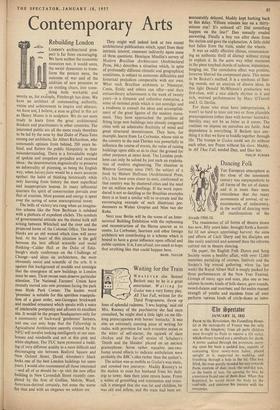Waiting for the Train
WHATEVER else Samuel Beckett may be he is a great -entertainer. Waiting for Godot was a very funny play. All That Fall, written for the Third Programme, threw up lines of splendid rudeness. 'I was hoping,' said old Mrs. Rooney of the psychiatrist she had once consulted, 'he might shed a little light on me life- long preoccupation with horses' buttocks.' It was also an extremely cunning piece of writing for radio, with provision for such evocative noises as the whirr of self-starter, the squawk of slain chicken and the far-off strains of Schubert's 'Death and the Maiden' played on an ancient gramophone: Some rather macabre one-two- bump sound effects to indicate ambulation were probably the BBC's idea rather than the guthor's.
The action was as mobile as Codas was static, and covered two journeys : Maddy Rooney's to the station to meet her husband from his daily trip to town; then their joint return home. From a welter of grumbling and rumination and cross- talk it emerged that she was fat and childless, he was old and infirm, and the train had been un- accountably delayed. Maddy kept harking back to this delay. 'Fifteen minutes late on a thirty- minute run! It's unheard of! Did something happen on the line?' Dan uneasily evaded answering. Finally a boy ran after them from the station and gave the explanation. A little child had fallen from the train, under the wheels.
It was an oddly effective climax, communicat- ing an authentic thrill of dismay without trying to explain it. In the same way other moments in the piece touched chords of sadness, impatience, longing, etc. The cumulative effect was positive, however blurred the component parts. This seems to be Beckett's method. It is a synthesis of fleet- ing moods, not an analysis of elusive ideas. In this light Donald McWhinnie's production was first-class, with a nice elderly rhythm to it and rich, worried performances by Mary O'Farrell and J. G. Devlin.
For those who must have interpretations, it wasn't so hard to tease out two or three plausible preoccupations (other than with horses' buttocks). Sterility may not be as bitter as it seems. The routines we impose on ourselves are futile. And dependence is everything. If Beckett says any- thing it is that we have to huddle together through life. The tramps in Godot could not do without each other, nor Pozzo without his slave. Maddy, in All That Fall, needed Dan, and Dan her.
PHILIP PURSER


































 Previous page
Previous page